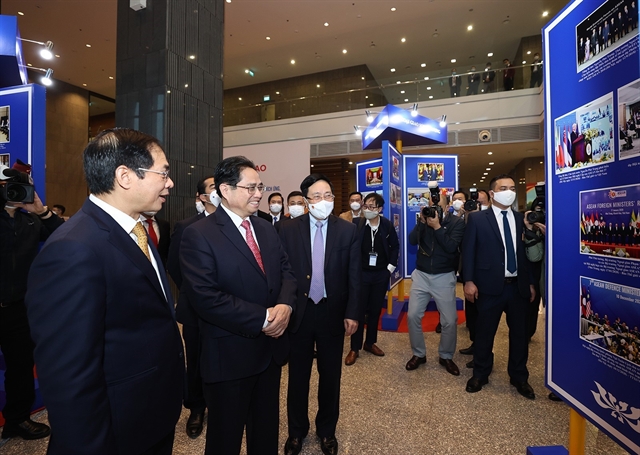
HÀ NỘI — Prime Minister Phạm Minh Chính pointed out basic orientations on three pillars of political, economic and cultural diplomacy while addressing the 31st National Diplomacy Conference in Hà Nội on Wednesday.
The Government leader praised the diplomatic sector for contributions over the past two years in the fight against COVID-19 including the vaccine passport strategy and for Việt Nam’s successful fulfillment of the role of the ASEAN Chair in 2020 and the Permanent Members of the United Nations Security Council for 2020-21 term.
He affirmed that diplomacy has made the world including foreign businesses love and trust Việt Nam more. The diplomatic force has become more mature in all aspects.
In terms of political diplomacy, he said it was necessary to affirm the foreign policy of independence, self-reliance, peace, cooperation and development; being a friend, a responsible and reliable partner of the international community; multilateralisation, diversification and ensuring the highest interests of the nation based on international law and equality among nations.
Diplomatic activities must make international friends love Việt Nam more, understand and support Việt Nam's path towards socialism, he said.
“Diplomacy must make a contribution to finalising institutions, cooperation in training human resources, attracting green technology, clean technology, green finance as well as promoting the implementation of effective free trade agreements, improving the investment environment, linking global production and supply chains, promoting an innovative start-up ecosystem,” he said.
He urged the diplomatic sector to popularise goals, viewpoints, tasks and solutions set forth by the 13th Party Congress, especially after the National Cultural Conference, contributing to preserving and promoting Vietnamese cultural values and Vietnamese people, bringing culture to the same level as politics, economy and society.
He asked the sector to continue to promote the Resolution of the 13th Party Congress and carry out the tasks set out at the recent National Foreign Affairs Conference.
All diplomatic activities must be for the sake of the nation and for the legitimate interests of the international community. Diplomatic activities need to show "emotion, sincerity, reliability, equality, efficiency and mutual development" and must be "resolute, steadfast, flexible, scientific and effective", he said.
Minister of Foreign Affairs Bùi Thanh Sơn said in the complicated global environment, the Vietnamese diplomatic sector had persisted in its principle of steadfastness, being flexible and creative to overcome challenges in order to synchronously implement key foreign affairs tasks and achieve outstanding key results.
One of the achievements he mentioned is to maintain a peaceful and stable environment, making an important contribution to firmly defending independence, sovereignty, unity and territorial integrity; continue to expand and deepen relations with various partners, especially neighbouring countries, important partners and traditional friends; maximise external resources for socio-economic development.
Rapidly changing, complicated and unpredictable situations of the world, which have left profound and multi-faceted impacts on the security, development and foreign affairs environment of our country, opened up opportunities but also posed stricter requirements for foreign policy, he said.
He said the diplomatic sector had very challenging but glorious tasks in the time ahead. The sector must promote its pioneering role in creating and maintaining a peaceful and stable environment, protecting the Fatherland from early on and from afar; take advantage of opportunities and external resources to serve socio-economic development and enhance national position and prestige.
“Việt Nam is entering a new strategic phase with a focus on realising aspiration, vision, goals and development direction of the country until the mid-21st century following the Resolution of the 13th Party Congress. The foundation, potential, position, international prestige and open network of foreign relations gained after 35 years of đổi mới (Renewal) serve as a solid base for our country to continue to strive forwards,” he said.
“In order to build a comprehensive and modern diplomacy, first of all, it is necessary to build a comprehensive and modern diplomatic sector because the sector is the key force of Vietnamese diplomacy based on three pillars of Party, State and people-to-people diplomacy,” he said.
Delivering a speech at the plenary session, Vietnamese Ambassador to the US Hà Kim Ngọc emphasised the trends of economic digitalisation and green growth.
He said Việt Nam can apply the experience of major economies to develop industries such as renewable energy and biology.
Việt Nam should integrate more deeply in supply chains, especially strategic supply chains for chips, semiconductors and vaccines, leading to vaccine autonomy and becoming one of the world’s suppliers, he said.
Vietnamese Ambassador to China Phạm Sao Mai said after 35 years of đổi mới, Việt Nam’s position and power has grown with stabilised economy and increasing growth rate.
The ambassador pointed out some shortcomings of the economy such as low contribution in the global supply chain, low contribution of technological factors to labour productivity, uneven development rate among localities and economic sectors, being vulnerable to impacts and fluctuations of the regional and global economic environment.
In that context, he said foreign affairs should persist with the goal of creating a favourable international environment, improving the efficiency of economic integration, effectively mobilising external resources for national development.
He said Việt Nam's foreign affairs work needed to follow major directions, including expanding the market for Vietnamese goods, services, and labour, seeking and promoting new areas of cooperation, fully exploiting free trade agreements’ benefits.
“External affairs should actively contribute to restructuring and transforming Việt Nam’s growth model, attracting resources for sustainable development including ODA, FDI, concessional loans, focusing on green development, digital transformation, smart agriculture, renewable energy and advanced manufacturing industry,” he said. — VNS